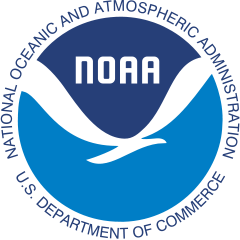Ocean Data Assimilation: Model Output

On the form below, select the “Required Function” to obtain the requested information. “Access Datasets” provides access to complete files.
| File Description | Required Function |
|---|---|
| Monthly Ensemble Means (ECDA) v3.1 1961-2012 |
|
| Monthly Ensemble Means (ECDA) v2.0 1979-2008 |
|
| Monthly Means (WOA21c) 2003-2011 |
|
ECDA v3.1
Currently, data is available online only via ftp. This data will be brought current and updated monthly in near real-time as the LAS becomes available. This version is being used to produce the initial conditions for IPCC/AR5 near-term predictions.
ECDA v2.0
The data available online is ocean model ensemble means formulated into monthly time series in one, five and ten year chunks. The data is available on its native grid (tripolar grid) or interlolated onto a latitude/longitude grid. CF conventions are followed for the naming of variables. Variables:
- mld_OD- mixed layer depth (m)
- mpe_OF- precipitation minus evaporation (m s-1)
- river_OF- river water flux (m s-1)
- sfc_hflux_OF- surface heat flux (W m-2)
- so_O1- salinity (psu)
- tau_x_OF- zonal wind stress (N m-2)
- tau_y_OF-meridional wind stress (N m-2)
- thetao_01- potential temperature (K)
- uo_01- eastward sea water velocity (m s-1)
- vo_01- northward sea water velocity (m s-1)
- wo_OD- upward Sea water velocity (m s-1)
File naming follows this stencil: variable_StartYearMonth-EndYearMonth.nc. For example, the timeseries containing the year 1979 potential temperatures would be thetao_O1.197901-197912.nc. The same variable but timeseries spanning the years 1979 through 1983 would be thetao_O1.197901-198312.nc.
WOA21c
This product is based on the compilation of the identified GTSPP and Argo data from Jan. 2003 to Dec. 2011.
Analysis and description of this product can be found in Chang, Y.-S., A. J. Rosati, S. Zhang, and M. J. Harrison (2008), Journal of Geophysical Research, 114, C02014, doi:10.1029/2008JC004970.
Variables:
- OBS_TEMP- OA temperature (degC)
- OBS_SALT- OA salinity (psu)
- OBS_TEMP_ERR- OA temperature error (degC)
- OBS_SALT_ERR- OA salinity error (psu)
*** We have CMORized the data using the new CMOR2/netcdf4 method. You should install NetCDF4 versions to access these files.
ODA home
ODA output
GSOP
Bibliography
Recent Publications
Chang, Y.-S.,S. Zhang,A. Rosati,T. Delworth, and W. F. Stern, March 2012: An assessment of oceanic variability for 1960-2010 from the GFDL ensemble coupled data assimilation, Climate Dynamic, Accepted.
Zhang, Shaoqing, M. Winton, A. Rosati, T. Delworth and B. Huang, 2012: Impact of Enthalpy-Based Ensemble Filtering Sea-Ice Data Assimilation on Decadal Predictions: Simulation with a Conceptual Pycnocline Prediction Model. Journal of Climate. in press.
Chang, Y-S, Anthony Rosati, and Shaoqing Zhang, February 2011: A construction of pseudo salinity profiles for the global ocean: Method and evaluation. Journal of Geophysical Research, 116, C02002, DOI:10.1029/2010JC006386.
Chang, Y-S, Shaoqing Zhang, and Anthony Rosati, July 2011: Improvement of salinity representation in an ensemble coupled data assimilation system using pseudo salinity profiles. Geophysical Research Letters, 38, L13609, DOI:10.1029/2011GL048064.
Zhang, Shaoqing, January 2011: Impact of observation-optimized model parameters on decadal predictions: Simulation with a simple pycnocline prediction model. Geophysical Research Letters, 38, L02702, DOI:10.1029/2010GL046133.
Zhang, Shaoqing, Z Liu, Anthony Rosati, and Thomas L Delworth, January 2012: A study of enhancive parameter correction with coupled data assimilation for climate estimation and prediction using a simple coupled model. Tellus A, 64, 10963, DOI:10.3402/tellusa.v64i0.10963. PDF
Zhang, Shaoqing, January 2011: Impact of observation-optimized model parameters on decadal predictions: Simulation with a simple pycnocline prediction model. Geophysical Research Letters, 38, L02702, DOI:10.1029/2010GL046133
Zhang, Shaoqing, December 2011:A study of impacts of coupled model initial shocks and state-parameter optimization on climate predictions using a simple pycnocline prediction model. Journal of Climate, 24(23), DOI:10.1175/JCLI-D-10-05003.1. PDF


